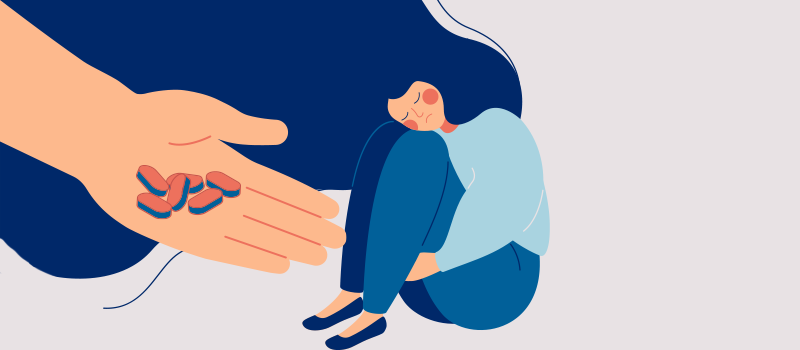What’s the Buzz
The Bee Healthy Blog
Feeling Irritable? 7 Medications That Could Be to Blame

Being upset or grumpy is perfectly normal when things don't go as planned. But if you're experiencing these emotions more frequently than usual or notice personality changes in yourself, there may be an underlying cause behind it.
Many medications can sometimes lead to mood changes, including feelings of anxiousness, irritability, and restlessness. This most often occurs when a person starts taking a new medicine or increases the dose of a current one. Read on to find out which medications can lead to mood changes and increased irritability as a side effect.
Which Medications Can Affect Mood?
Let's take a look at some prescription drugs that may contribute to mood changes like depression and irritability.
Corticosteroids
Corticosteroids are a type of anti-inflammatory drug. They're commonly used to treat a wide range of medical conditions, including asthma, arthritis, irritable bowel syndrome, and allergies.
Some recent research suggests that corticosteroid therapy may be linked to various side effects, including rapid and drastic changes in a person's mood (emotional lability), such as low mood, irritability, depression, and anxiety. Most of these cases occur within the first five days of treatment, but some people may experience them a few weeks after starting the medication. Researchers have also found that higher dosages of corticosteroids pose a greater risk of these mood changes.
ADHD Medications
Stimulant medications are typically the first treatment choice for people with attention deficit/hyperactivity disorder (ADHD). Examples of stimulant drugs include methylphenidate, amphetamine, and dextroamphetamine.
All of these medications are classified as central nervous system stimulants, meaning that they alter the level of chemical messengers in your brain to increase alertness, focus, and motivation and tackle symptoms of ADHD. However, these changes in the brain may also contribute to mood disorders like depression, and increased feelings of irritability, emotional reactivity, agitation, and nervousness. That said, research suggests that the long-term use of these medications is still considered safe for many people and poses a low risk of these unwanted effects in patients.
Cholesterol-Lowering Drugs
Statins are commonly prescribed to reduce the levels of low-density lipoprotein (LDL) cholesterol in the blood. LDL cholesterol is often referred to as "bad cholesterol."
While statins can effectively lower cholesterol levels and are generally well-tolerated, scientific research has found that they may sometimes be linked to behavioral changes. In these rare cases, the person might notice mood changes, increased aggression, irritability, anxiety, and sleep problems like nightmares. Studies have also noted that these side effects tend to persist with the continued use of statins, but they typically resolve when the medication is stopped.
Antidepressants
Selective serotonin reuptake inhibitors (SSRIs) and serotonin-noradrenaline reuptake inhibitors (SNRIs) are two groups of antidepressants commonly prescribed to manage different mental health conditions and mood disorders. They can be used to treat anxiety, severe depression, and bipolar disorder, as well as symptoms of premenstrual syndrome (PMS) and premenstrual dysphoric disorder (PMDD).
When you first start taking these medications, you may experience side effects such as worsening irritability, anxiety, and insomnia. You might also feel more easily agitated, shaky, depressed, or nervous. However, the side effects tend to dissipate and improve over time.
It'll likely take several weeks before you benefit from this treatment. Therefore, it's important to continue taking these medications even if you experience these unwanted effects unless otherwise advised by your doctor. Over time, you should find that the positive outcomes of taking the antidepressant outweighs its side effects, if any.
Birth Control Pills
Some women may find that birth control pills help with improving or regulating mood. However, it is also possible for your mood to be negatively affected by birth control medications.
Oral contraceptive pills are the most widely studied for their mood-related side effects. Recent research has discovered that some women taking these pills have reported anxiety, irritability, and mood swings. Evidence suggests that both the female hormones, estrogen and progesterone, may influence brain function, which could contribute to the negative mood changes and depression reported by women taking oral contraceptive pills.
Other forms of birth control may also affect your emotions. For instance, a study has shown that the use of a hormonal intrauterine device (IUD) is associated with anxiety, depressive symptoms, and sleep problems. That said, these effects can vary from one to another, so some women may find that their mood remains unaffected by these medications.
Anticholinergic Drugs
Anticholinergic medications are used to manage a wide array of health conditions, including Parkinson's disease, chronic obstructive pulmonary disease (COPD), and an overactive bladder.
Lower dosages of these medications may lead to anxiety, insomnia, and behavioral disturbances. And at higher dosages, they could contribute to agitation, confusion, and hallucinations. Decreasing the dose of the drug can help reduce its side effects, but this should only be done after you talk to your doctor.
Proton Pump Inhibitors
Proton pump inhibitors (PPIs) are a group of drugs used to treat gastroesophageal reflux disease (GERD). Although these medications have demonstrated a good safety profile through many years of clinical use, they may lead to mood-related side effects in some people. Several research studies have discovered that PPIs can increase the risk of depression and feelings of anxiety. Scientists also found that a longer duration of use increases the risk of these adverse effects.
The exact reason why PPIs may bring about negative changes in mood is still unknown. However, science suggests that these medications may reduce the absorption of essential nutrients and vitamins into the body, thus, impairing the optimal function of the central nervous system and the brain.
What Should I Do If I Experience These Side Effects?
The best thing you can do is consult your treating physician if you suspect your medication may be responsible for the mood changes you experience. You should not stop taking your medicine or make any changes to your dosing regimen without first seeking medical advice as this can lead to severe consequences.
If your medication is the likely cause of your increased irritability and agitation, your doctor may recommend decreasing the dose of the drug or switching to another medication with a lower risk of causing the side effect. This can help to resolve your symptoms and help in regulating mood changes.
References
- https://www.ncbi.nlm.nih.gov/pmc/articles/PMC3853679/
- https://www.sciencedirect.com/science/article/pii/S0149763419302350#sec0190
- https://medlineplus.gov/druginfo/meds/a601234.html#side-effects
- https://www.ncbi.nlm.nih.gov/pmc/articles/PMC5005588/
- https://www.ncbi.nlm.nih.gov/pmc/articles/PMC5888105/
- https://www.nhs.uk/mental-health/talking-therapies-medicine-treatments/medicines-and-psychiatry/antidepressants/side-effects/
- https://www.ncbi.nlm.nih.gov/pmc/articles/PMC9218393/
- https://www.ncbi.nlm.nih.gov/books/NBK555893/
- https://www.nature.com/articles/s41598-022-24244-z
- https://www.ncbi.nlm.nih.gov/pmc/articles/PMC9099128/












SOCIAL